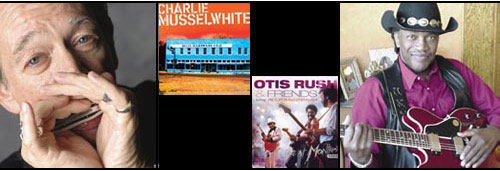
CHARLIE MUSSELWHITE
Harmonica player and blues legend Charlie Musselwhite started playing in his teens with legendary Chicago musicians. Since his 1966 debut Stand Back! (Vanguard), “Memphis Charlie” has rubbed shoulders with contemporaries such as Bonnie Raitt, Tom Waits, and The Blind Boys of Alabama, just to name a few.
Born in Kosciusko, Mississippi in 1944, Musselwhite relocated to Memphis as a teenager, where he worked a series of odd jobs. In time, he trekked up the legendary Highway 51 and met up (and eventually moved in) with Big Joe Williams in South Side Chicago. Musselwhite was befriended by fellow blues icons Muddy Waters, Buddy Guy, Howlin’ Wolf, and John Lee Hooker.
Inspired in part by Paul Butterfield’s success with college gigs, Musslewhite started his own band. By the mid-1960s, he relocated to San Francisco where he found ample work and, despite having neither a manager nor experience, he released his debut album. “It was like being thrown into the deep end of the pool with no instruction whatsoever,” he recalls, but it began a music pilgrimage that has sustained nearly 35 albums, multiple Grammy nominations, and the respect of fans all over the world.
Musselwhite has stretched to include elements of Cuban and Brazilian jazz into his music on recent albums, such as 1999’s Continental Drifter. More recently, he toured with acts such as Ben Harper and has recorded with countless other notable musicians.
Musselwhite’s Delta Hardware, released this month on Peter Gabriel’s Real World Records, is a strong showing from this strong performer. With seven original tunes, great guitar from Musselwhite himself, and the masterful harp that harp fans crave, it’s a winner.
OTIS RUSH
In order to play great guitar, one must possess great skill and dedicated passion. In order to play great guitar upside down, one must be a genius. Such is the case of Otis Rush, one of only a select few—Jimi Hendrix included—who made a prolific career by playing a right-handed guitar left-handed. This technique spawned several imitators but few duplicators.
Otis Rush is a legend in his own right.
Born in 1934 in Philadelphia, Mississippi, Rush traveled to Chicago at the dawn of the 1950s to seek his fortune. After hitting the South Side club circuit, Rush was eventually signed to Cobra Records by the middle of the decade. Such songs from this period as “Double Trouble” gained Rush notoriety around Chicago. As the 1960s approached, Rush began to record singles under the successful Chess label.
Rush’s guitar virtuosity would come to define the Chicago Blues sound as his intricate and droning intonations would form the musical core for such future icons as Eric Clapton and Stevie Ray Vaughan. Rush’s breakout and breakthrough 1968 debut album, Mourning In The Morning (Atlantic) would make prominent use of the Mussel Shoals rhythm section, including another younger guitar prodigy named Duane Allman.
During his 20-plus year residency at Mercury Records, Rush would release several eclectic blues albums, each one adding to his growing legacy. Constant touring would also keep Rush’s name relevant in music history. In capturing this spirit, Eagle Records released Live At Montreux 1986: Otis Rush & Friends, an album showcasing Rush’s best-known songs and featuring those artists, like Eric Clapton, whom he inspired.
Currently recovering from a stroke, Rush still plays guitar. Although he has no immediate plans, he is undergoing physical therapy and hopes to return to performing and recording. E
![]()
Elmore: What are you listening to right now?
Charlie Musselwhite: I’ll have to walk over to the record player…The San Francisco Jazz Collective. A flamenco guy named Camarone. Albert King. Ben Harper. A fado singer named Amalia I picked up in a flea market in Switzerland.
Otis Rush: I listen to Kenny Burrell “Chitlins Con Carne” every morning!
EM: What was the first record you ever bought?
CM: “Maybe “Let’s Play House” by Elvis Presley. “Blue Monday” by Fats Domino, probably something by Hank Williams.
OR: My first record I bought was Charles Brown.
EM: Who would you like to write with that you haven’t?
CM: I hardly ever have written with anybody. It just happened to work out that
way this time. I don’t really think about wanting to write with somebody, but when it happens right, it’s pretty cool.
OR: Carlos Santana
EM: What was the first instrument you played?
CM: Probably harmonica, but I started playing blues on the harmonica and guitar at about the same time, when I was around 13. There were always harmonicas around. Common kid of toy or gift, in the South. I have an entire album of me playing guitar, on my own label, it’s only available at gigs.
OR: I picked up the guitar and the harmonica at the same time.
EM: What brought you to the instrument you now play?
CM: I had an uncle who played harmonica, and my dad played. I still do play solo shows on the guitar with harmonica on a rack, and I’ve done tours opening for BB King, playing solo.
OR: I focused on the guitar because I was able to express myself better.
EM: Who would you like in your rock and roll heaven band?
CM: Otis Span on piano, Judge Riley on drums, Ransom Knowling on bass. There are so many guitar players, wow, that’s a touch on. How about Eddie Taylor? If you ask me this question tomorrow, I’ll give you a whole different set of answers. Charlie Patton on vocals.
OR: There are so many but Stanley Turrentine would be my horn man.
EM: What’s your favorite album of all time?
CM: When I was a teenager in Memphis and we’d have these card games and parties and one that was real popular and that I think is still great was probably The Best of Jimmy Reed on Vee Jay…but I could easily come up with another two dozen all-time favorites.
OR: My favorite album is the Kenny Burrell Midnight Blue.
EM: Where do you buy your music?
CM: When I was a kid in Memphis I was looking for 78s and 45s, and I would find them in junkyards; record stores didn’t have them. You could find tons of old 78s for a nickel or a dime and I’d come across something that would look interesting and I’d just take it. So I discovered a lot of music that I ordinarily would never have known about and it was like folk music from other parts of the world. There is this other music that has this feeling like blues has, a kind of spirit, it’s not the Top 40 of a place, it’s the Bottom 40, the Back 40. Music of the people. The themes that you find in blues are the themes of humanity everywhere: lost and found love, hard times. So all cultures seem to have their own music of lament. When I met these musicians, even though we couldn’t speak the same language, we could play together effortlessly because we were coming from a place where you don’t have to explain it. The key ingredient is the feeling, coming right from the heart.
OR: These records are ones I have collected over time. A lot is also sent or given to me.
EM: What was the song that made you realize you wanted to be in music?
CM: I always wanted to play, but I didn’t think about playing as a profession until the first time I got paid, and that got me focused (laughs). I was hanging out in Chicago in ’62, I would still be doing it if I never made a record. Or nobody had ever heard of me. It’s just something I did. I was just hanging out in all these bars all around Chicago. I was having a real good time, there were just tons of blues bands all over: Muddy, and Wolf, and Little Walter and Big Walter, but I wasn’t promoting myself or anything, I was just hanging out. A waitress I’d gotten to know told Muddy “You ought to hear that boy play harmonica, and that was it. Muddy made me sit in. Then wherever he saw me, he’d have me sit in, then word kinda sorta got out and I was sitting in all over the place, Wolf would have me sit in and Little Walter and Sonny Boy . Then somebody would come by and I’d get a couple of bucks, and it was like a light bulb went off. “They’re going to pay me?” I was having fun. I was 18. People like Johnny Nighthawk and Floyd Jones started hiring me for gigs and we were playing in bars all around the south side, west side, we’d play for tips on the streets, the Maxwell St. Market, and it got really focused. And now it’s no more a hobby—this is paying the bills…a little bit. It wasn’t much money, but if you’re a teenager with no responsibilities, it was a hell of a ride.
OR: That would be after my sister took me to see Muddy Waters’ show. I knew then I wanted to play the blues.
EM: What musician influenced you most?
CM: Will Shade. I’ve listened to so many people and connected. I knew a man named Will Shade, who in his heyday had a group called the Memphis Jug Band, like a blues band, but acoustic. He had a tub bass, and a jug and a harmonica. He was a harmonica player, and he was one of the first guys to play lines instead of making like sound effects or something. He taught Walter Horton, who I later knew in Chicago. I don’t know who taught Will Shade, but it goes way back. Everybody I ever listened to had some impression on me. Little Walter and Big Walter, both Sonny Boys, I didn’t know the first Sonny boy, but I sure had a whole pile of his 78s, and knew a lot of people who knew him. Big Joe Williams, he played a 9-string guitar, wrote “Baby Please Don’t Go.”
There are certain people that have this timeless quality to them, every time you hear it it’s just as good as the first time; Jimmy Reed, Hank Williams, there are others too.
OR: Charles Brown has played a big role.
And one more…Over the decades you have been one of the mostinfluential guitar players in the history of music. How do you feel about all the guitar players out there copying your style: Eric Clapton, Luther Allison, Peter Green, etc.
OR: I just am very happy that I can influence these great guitar players. It is an honor. We all have something to learn from each other.
EM: What’s your desert island CD?
CM: Charlie Patton. The complete works of Charlie Patton. I never get tired of hearing them.
OR: I would like to have my own CD “Any Place I’m Going”
Editor’s note: Charlie Musselwhite wrote us, “I have fond memories of Otis from the time I lived in Chicago…me and Johnny Young used to open for Otis at the I-Spy Lounge. Otis once said that it was the roughest bar in Chicago. I don’t know if that’s true, but it certainly was rough.”


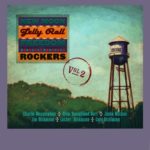
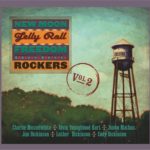
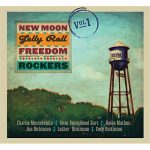
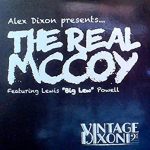

[…] Charlie Musselwhite Kim Wilson Mark Hummel Rick Estrin Sugar Ray […]